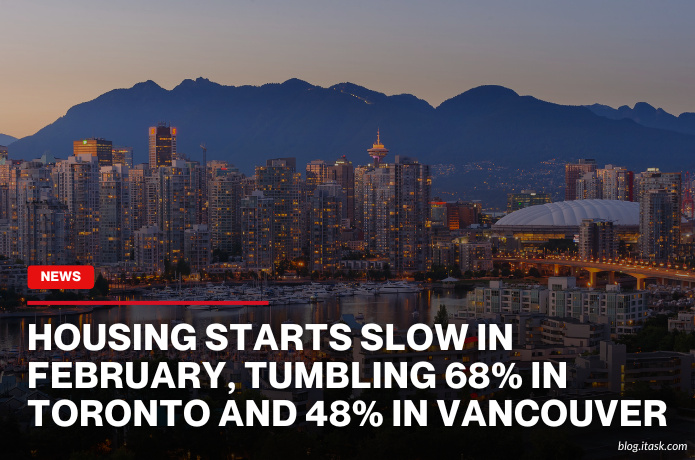Housing Starts Slow In February, Tumbling 68% In Toronto And 48% In Vancouver
Housing Starts Slow In February, Tumbling 68% In Toronto And 48% In Vancouver

In February 2025, Canada's housing market experienced a notable slowdown, with the seasonally adjusted annual rate (SAAR) of housing starts decreasing by 4% to 229,030 units, down from 239,322 units in January. citeturn0search1 This decline erased the modest 3% gain observed in the previous month.
The decrease was particularly evident in urban centers with populations over 10,000, where actual housing starts fell by 5% between January and February, totaling 209,784 units. The multi-family housing segment saw a 6% reduction to 166,508 units, while single-detached starts experienced a slight 1% decrease to 43,276 units.
Toronto and Vancouver were among the hardest-hit cities. Toronto experienced a significant 68% year-over-year drop in housing starts, while Vancouver saw a 48% decline during the same period. Both cities faced reductions in multi-unit and single-detached housing projects.
Economists have expressed concern over these figures. TD Economist Rishi Sondhi noted that the February data was weaker than expected and indicated a 5% decline compared to the fourth quarter average. He warned that this trend could negatively impact residential investment and GDP growth in the first quarter.
The Canadian Real Estate Association (CREA) also reported a downturn in home sales, with a 10.4% year-over-year and 9.8% month-over-month decrease in February. This marked the lowest level of home sales since November 2023 and the most significant monthly decline since May 2022, reflecting growing uncertainty in the housing market.
Despite the overall decline, Montreal presented a contrasting trend with a 6% year-over-year increase in housing starts for February. This follows a remarkable 112% surge recorded in January, highlighting regional variations in housing market activity across Canada.
